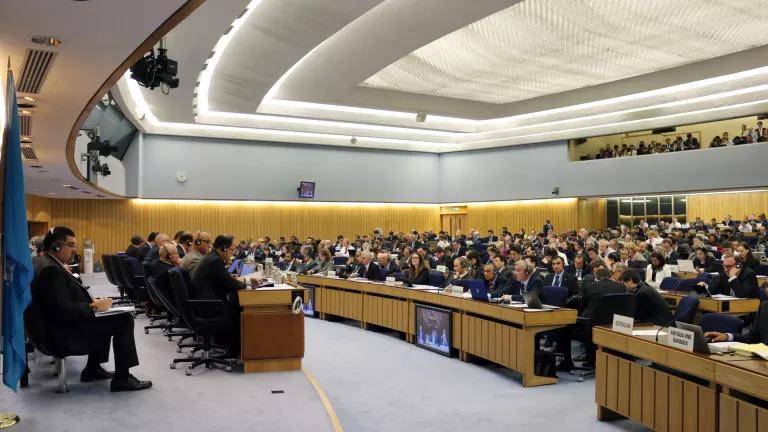Why the IMO's 2020 Global Fuel Sulfur Limit Is Significant

This blog was coauthored by NRDC consultants Freda Fung and Rich Kassel.
The International Maritime Organization (IMO) made a historic decision last Thursday, finalizing its plan to dramatically reduce the global sulfur limit of marine fuels by 85 percent in 2020. When the plan is implemented, the global cap in sulfur in marine fuels will drop from the current 3.5% to 0.5%.
The outcome of the IMO debate was not guaranteed. There was stiff opposition from some in the shipping industry, oil industry and marine fuel-producing countries, which wanted the IMO to delay the implementation date to 2025. By sticking with the originally-proposed 2020 deadline, the IMO will be preventing an estimated 200,000 premature deaths worldwide.
This is a major victory for cleaning up air pollution in port cities and around the world, reflecting the growing global consensus that more aggressive emission cuts are necessary from the shipping sector.
The need for action is clear: currently, oceangoing ships are allowed to burn a high sulfur residual oil (also called “bunker fuel”) that has more than 2,500 times as much sulfur as the diesel fuel that is used in vehicles in North America, Europe, and the Chinese coastal provinces. This residual oil also contains high amounts of toxic compounds, such as metals and polycyclic aromatic hydrocarbons. This higher-sulfur fuel produces pollution that is linked to increased asthma emergencies, bronchitis, cancer, and thousands of premature deaths every year.
The new global cap will supplement China’s efforts to combat shipping pollution in two ways.
First, China adopted Domestic Emission Control Area (DECA) regulations last December that requires the same low-sulfur fuel to be used at and near the ports in China’s three busiest port regions. However, the DECA requirements only stretch 12 nautical miles from China’s coastline, and only in the port regions covered by the DECA regulations. Because air pollution can travel for hundreds of miles, lowering the sulfur content of marine fuel beyond China’s DECA boundary is an important supplement to China’s domestic regulation.
Second, by setting a global cap, the new IMO commitment removes any risk that other Asian ports might compete with Chinese ports by continuing to allow the cheaper, but highly polluting high-sulfur fuel.
With the implementation date now set for 2020, it is time to look at ways to make it most successful. Some shipping companies have raised concerns about effective and robust enforcement of the new global sulfur cap, especially on the high seas. It is important that port and coastal states begin developing their enforcement capacity so they can enforce the cap within their exclusive economic zones.
China is committed to developing a robust enforcement for DECA, and we have been supporting the country’s efforts through sharing of best practices and facilitating exchanges with regulatory agencies in Europe and the US. We will continue this effort, and are ready to assist other port countries that have not been regulating marine fuel to establish their enforcement programs.
In addition to agreeing on the global cap on sulfur, the IMO made two other major decisions at last week’s meeting: it approved the designation of the Baltic Sea and North Sea as NOx Emission Control Areas (NECAs), but delayed setting a greenhouse gas target for shipping until at least 2018. We welcome IMO’s approval of the application of the North Sea and Baltic Sea NECAs. However, we are disappointed that the IMO failed to agree on a greenhouse gas reduction target for the shipping industry.
A growing number of studies and data have shown the increasingly severe damages caused by climate change (see for example here and here). With shipping being the only sector not subject to a climate change agreement, the IMO should show strong leadership and take more progressive steps in setting a target as early as possible. An analysis by ClimateHome sets forth a number of possible immediate steps that could and should be taken, and explains why improving the energy efficiency of the shipping industry should be an urgent priority.
For now, it’s time to celebrate the IMO’s commitment to cleaner, lower-sulfur marine fuels. Reducing sulfur by 85 percent is a major step forward that will bring cleaner air—and improved human health—to port cities worldwide.



